Big 12 rebirth: UCF completes journey to Power Five in record time. Here's how.
For some, UCF's official promotion to the Big 12 Conference and Power Five status when the clock strikes midnight Saturday might seem like a long time coming.
After all, the Knights have won 86 football games over the last decade, a number bettered by only 13 teams the FBS: Alabama, Clemson, Ohio State, Georgia, Oklahoma, Notre Dame, Boise State, Wisconsin, LSU, Oklahoma State, Oregon, Michigan and San Diego State. That includes an outlier 0-12 campaign in 2015, in which they lost to Florida International, Furman and everyone else on the schedule, too.
The reality, though, is UCF's ascent has been meteoric in the grand scheme. Founded in 1963, and launching its football program in 1979, it is now the youngest university in the Power Five by some distance.
'He's been through the fire': Gus Malzahn could give UCF football stability as Big 12 era arrives
'It's time': As UCF joins Big 12, Gus Malzahn says calls for a Big Four in state of Florida
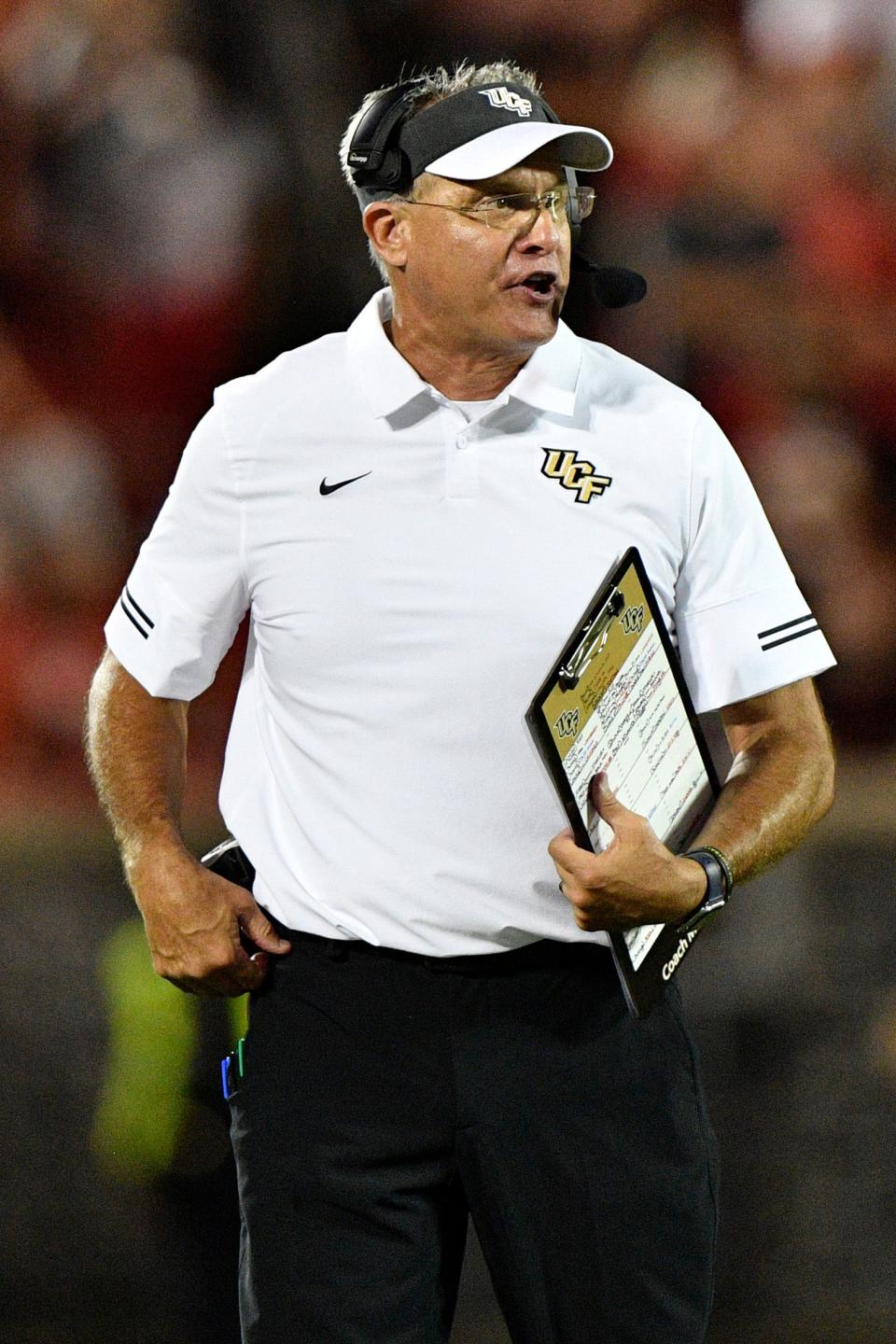
The Golden Knights — yep, Golden until 2007, don't forget — only joined college football's preeminent subdivision 27 years ago. In the time since, they have played in four conferences under six coaches, appearing in 14 bowl games and hoisting a pair of New Year's Six trophies.
And, of course, there was that one national championship. Debate that amongst yourselves, dear readers, there's enough to get through as it is.
Let's look back at the road the Knights took to get here.
1996 — Moving up from Division I-AA
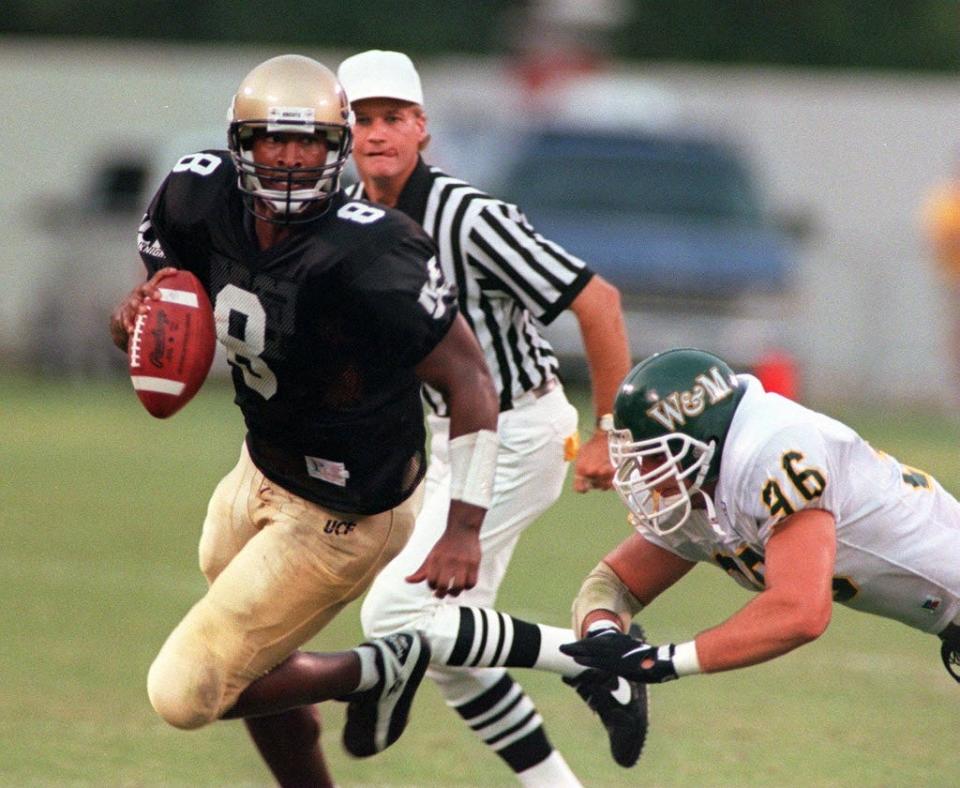
At the time UCF transitioned into Division I-A football independent in 1996, it became the first program to play in four NCAA divisions. The Golden Knights started as a D-III team in 1979, jumped to D-II in '82 and then again to I-AA — now known as the Football Championship Subdivision — in '90.
Gene McDowell steered UCF into major college football for the first two years, but he was forced to resign in January 1998 after pleading guilty to lying to federal agents and a grand jury about how his players knew they were being investigated for cellular phone fraud, according to an archived article from the Tampa Bay Times.
McDowell, in charge of the Golden Knights from 1985-97 and was the school's athletic director for seven years, never coached college football again. He told the Orlando Sentinel in 2001 he was trying to look out for his team, adding, "I’m not sure I would have done things differently, but I may have done them in a different way."
Mike Kruczek inherited the reins as head coach, but Daunte Culpepper quickly emerged as the face of the fledgling I-A program.
Culpepper rewrote UCF's record books in his three years at quarterback. He threw for 9,341 yards with 72 touchdowns and 32 interceptions, and rushed for 1,003 yards and 19 more scores. In Culpepper's junior year, the Golden Knights went 9-2 — its only losses to established powers Purdue and Auburn — as he finished sixth in Heisman voting; Texas running back Ricky Williams comfortably won with 714 first-place votes.
UCF accepted a conditional bid to the Oahu Bowl in 1998, but was left out when a series of Pac-10 results resulted in Washington heading to Hawaii.
An expected dip in 1999 resulted in a 4-7 finish, but UCF posted back-to-back winning campaigns in its last two years as an independent. It was highlighted by a memorable 40-38 victory at Alabama as Javier Beorlegui kicked a game-winning 37-yard field goal with three seconds left in regulation.
2002 — Ready for MACtion
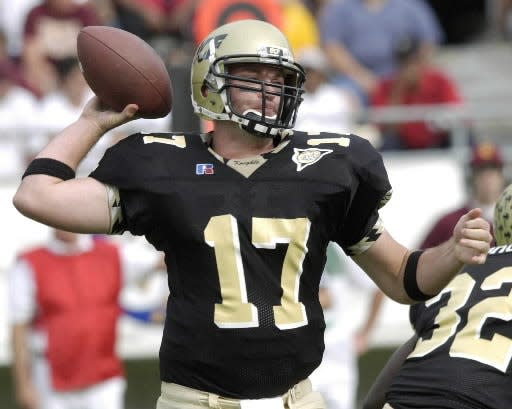
Long before the values of FBS conference television contracts skyrocketed, competing as a Division I-A independent posed significant financial challenges. The Orlando Sentinel reported in 2000 that UCF spent roughly $40,000 marketing its football program to the SEC, ACC, Big East, Conference USA and MAC. Only the latter showed interest.
That interest, however, was contingent on Marshall. The Thundering Herd, which won 114 games in the 1990s and produced first-round NFL draft picks Randy Moss and Chad Pennington, were a hot commodity and primed for an eventual departure to Conference USA.
Marshall stuck around just long enough. In August 2001, the MAC extended a provisional five-year, football-only invitation to UCF, and the school's board of trustees unanimously approved the move two months later. The Golden Knights paid $200,000 to join the league and began play in 2002, while also keeping profitable games against Penn State, Arizona State and Syracuse on the schedule.
"At this point in our development, this is a really good fit for us," then-UCF Athletic Director Steve Sloan told trustees at the time. "This gives us opportunities to have a schedule. This gives us a [chance to play for a] conference championship. This gives us a chance to play in two bowl games. This gives us an opportunity to develop some real rivalries."
From a competitive standpoint, UCF's tenure in the MAC was ultimately forgettable. The Golden Knights started strong with a 7-5 record in '02, including a 6-2 mark in its debut campaign against MAC opponents. but went 3-9 the next year, resulting in Kruczek's dismissal, and 0-11 in 2004 — George O'Leary's first season in charge. The Golden Knights failed to top 30 points in a game during the doomed '04 slate, and were beaten by an average of 17 points per game.
2005 — Fully aligned in Conference USA
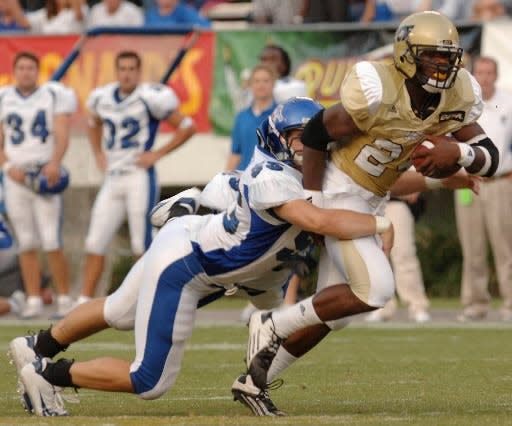
Near the end of 2003, UCF sought a conference that would allow membership for all of its sports. Conference USA, around the same time, was scrambling to replace five outgoing members: Cincinnati, Louisville and South Florida bolted for the Big East, TCU headed for the Mountain West and Army elected for independence.
So, the Golden Knights were suddenly a much more appealing proposition for C-USA than three years prior. UCF was one of five schools — along with Marshall, Rice, SMU and Tulsa — granted league membership in time for the 2005 football season.
"We are extremely pleased to be joining Conference USA," UCF President Dr. John Hitt said in a November 2003 release. "This is an exciting day for UCF and its athletics program. Conference USA is a great league athletically and academically, and it’s a great fit for UCF geographically."
In time for its move to C-USA, UCF opened the state's first indoor practice facility — the $4.3 million Nicholson Fieldhouse. For context, Florida State spent nearly $15 million and unveiled its indoor practice facility in 2013. Florida constructed its building in 2015, Miami opened one in 2018 and rival South Florida finally opened its building in January of this year.
More importantly, in December 2005, UCF's board of trustees approved funding for a $51 million football stadium on the campus' north side. The cavernous Citrus Bowl, located 16 miles west of the university in the heart of downtown Orlando, needed renovations, and school officials grew dissatisfied at the lack of revenue generated from games.
Construction began in the spring of 2006 and was finished in time for the 2007 season opener — a nationally televised showcase against No. 6 Texas. That game, a 35-32 thriller of a loss, offered a first glimpse into what UCF could grow to become, and it also coined the stadium's nickname as the sellout crowd shook the stands.
The Bounce House was born.
As the Tampa Bay Times pointed out earlier this week, UCF reported $4.3 million in football revenue to the U.S. Department of Education in 2006. That figure doubled in 2008, and again in 2013.
Results soon followed as UCF blossomed into a perennial C-USA contender. The Golden Knights secured their first bowl invitation after going 8-4 in 2005, and won the league for the first time in '07 as Kevin Smith challenged Barry Sanders' single-season FBS rushing record. Smith rushed for 2,567 yards and 29 touchdowns in an historic junior season, placing eighth in Heisman voting.
In 2010, the Golden Knights ended the season ranked in The Associated Press' Top 25 for the first time, checking in 21st after prevailing in a 10-6 slugfest over Georgia in the Liberty Bowl.
2013 — Entering the rebranded American
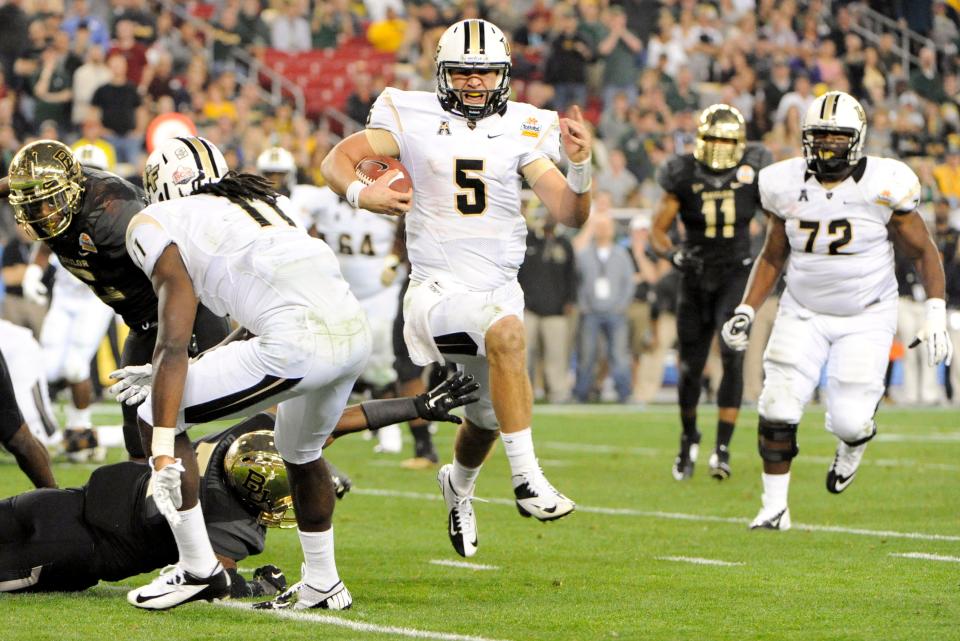
College football's landscape truly started to shift at the start of the 2010s. Texas A&M and Missouri joined the SEC, Nebraska and Maryland moved to the Big 10, Colorado and Utah were added to the Pac-10.
The Big East, which previously lost Miami and Virginia Tech to the Atlantic Coast Conference in 2003 and Boston College in 2004, was raided by other BCS leagues in 2011 after negotiations broke down over a media rights package with ESPN worth a reported figure of $11 million annually per school. TCU backed out of its agreement to join the Big East, Pittsburgh and Syracuse defected to the ACC and West Virginia relocated to the Big 12.
On Dec. 7, 2011, Big East Commissioner John Marinatto introduced UCF, Houston and SMU as all-sports members while the league added Boise State and San Diego State for football only in time for the 2013-14 academic year.
But, the Big East broke down further in the 18 months that followed. The league's seven non-FBS football schools — DePaul, Georgetown, Marquette, Providence, St. John's, Seton Hall and Villanova — voted unanimously in December 2012 to exit as a group, ultimately retaining the Big East name and the right to hold a postseason men's basketball tournament at Madison Square Garden in New York. Boise State and San Diego State then scrapped plans to move and rejoined the Mountain West Conference.
Presidents of the remaining universities approved the rebranding of the American Athletic Conference in April 2013. UCF was one of the American's 10 original members along with Cincinnati, Connecticut, Houston, Louisville, Memphis, Rutgers, SMU, South Florida and Temple.
And 2013 proved to be a transcendent year for UCF's football program. The Knights notched signature road wins at Penn State and Louisville, the latter serving the school's first against an AP Top 10 opponent, and captured the inaugural AAC title with a perfect 8-0 mark in league play.
Still, UCF entered the Fiesta Bowl as 17-point underdogs against Baylor. Blake Bortles cemented his status as a first-round NFL draft prospect, throwing for 301 yards, rushing for 93 more and accounting for four touchdowns as the Knights upset the Bears 52-42. Storm Johnson ran wild as well, totaling 124 yards and three TDs on 20 carries.
"I'm just so proud of my team, University of Central Florida — I think the whole world knows us now," linebacker Terrance Plummer, the Fiesta Bowl's defensive player of the game, said in the aftermath.
The Knights went 0-12 two seasons later, ending O'Leary's spell in charge with four games remaining in the 2015 season. Scott Frost was named his successor, and UCF's brand — on and off the field — changed dramatically.
Frost brought his uptempo spread playbook from Oregon and transformed the Knights into the nation's highest-powered offense in 2017. UCF scored 48.2 points per game and ran the table, finishing the regular season with top-25 triumphs against South Florida and Memphis.
Frost accepted the head coaching position at his alma mater, Nebraska, following the AAC's championship game but vowed to lead the Knights into the Peach Bowl to take on Gus Malzahn's Auburn Tigers. UCF reeled off 21 unanswered second-half points, a pair of McKenzie Milton touchdown passes and Chequan Burkett's game-sealing pick-six, to defeat Auburn 34-27 and complete the undefeated season.
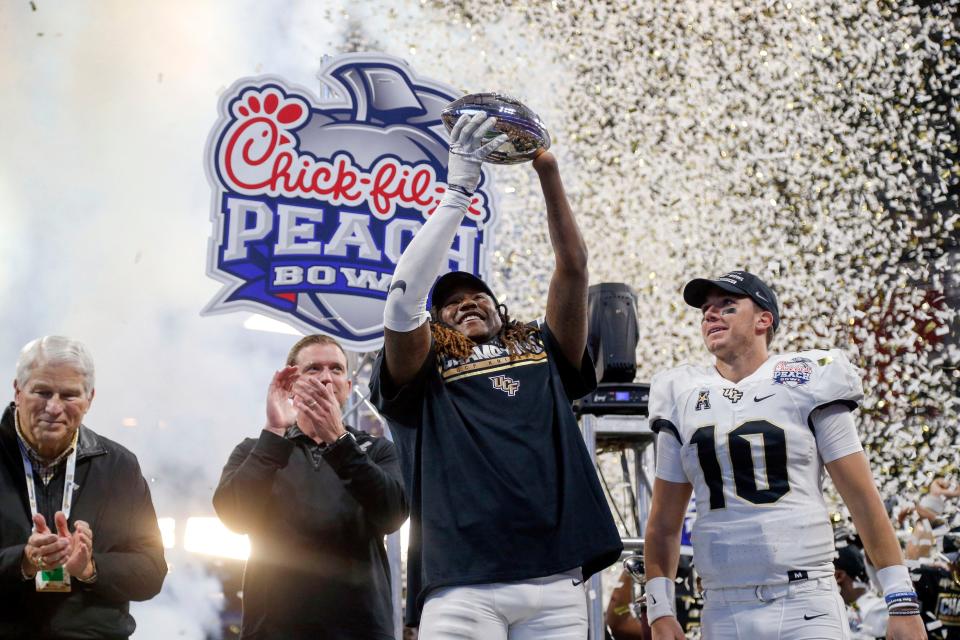
Then-athletic director Danny White proclaimed the Knights "national champs," and the Knights held a parade at Walt Disney World, sparking spirited national conversation about the team's merits and the lack of inclusion for Group of Five programs within the four-team College Football Playoff. The NCAA recognized UCF's national title in its 2018 records book after finishing No. 1 in the Colley Bias Free Matrix Rankings.
Improbably, the Knights ran the table again in 2018, this time with Josh Heupel in control and shifting to an air raid offensive scheme. UCF won all 12 of its regular-season games, defended its AAC crown despite losing Milton to a catastrophic knee injury and were again denied an invitation to the CFP. The Knights booked a return trip to the Fiesta Bowl, but lost 40-32 to LSU. The Tigers won a national championship 12 months later.
UCF recorded four AAC championships in a decade, falling short of a fifth with a December loss at Tulane. However, with its combination of football success, an enormous undergraduate population and a top-20 national television market, the school put itself on the radar at precisely the right moment.
2023 — The long awaited Power 5 jump

Oklahoma and Texas, long the Big 12's premium brands, reignited realignment in the summer of 2021 when its respective boards of regents unanimously voted to accept invitations into the SEC.
Then-Big 12 Commissioner Bob Bowlsby, who decided against expansion on several previous occasions, extended invitations to UCF, Houston and Cincinnati from the American Athletic Conference and FBS independent BYU. All four teams accepted, and were granted membership on Sept. 10, 2021.
'It was amazing, to be honest': UCF impresses recruiting targets ahead of first season in Big 12 Conference
"I am learning a lot more about it, but I can tell you walking around campus, spending time with (athletic director) Terry (Mohajir) and his team, they are very brand-focused," current Big 12 Commissioner Brett Yormark said last October during his first visit to Orlando. "Incredible marketing opportunities here, which I am excited about and we could possibly learn from, in fact.
"I think this is a conference that continues to get better. I think the addition of UCF, all of its sports programs and the success it has had, it will force us to get better. We are excited."
UCF, Houston and Cincinnati reached an agreement with the AAC last June over an $18 million buyout, paid over 14 years, to join the Big 12 in 2023. Had a settlement not been agreed, the three schools would not been granted release until July 1, 2024, as league bylaws require departing members to provide 27 months notice and pay a $10 million exit fee.
"All three institutions enjoyed tremendous success under the American Athletic Conference banner, and all three were instrumental in taking the conference to great heights, both athletically and academically," Aresco said. "We wish them the best and look forward to having them compete in our conference in 2022-23."
The American subsequently added Charlotte, Florida Atlantic, North Texas, Rice, UAB and UTSA, all of whom will enter the league for the 2023 football season.
Despite losing Texas and Oklahoma, the Big 12 completed a six-year, $2.28 billion media rights deal with ESPN and Fox Sports in October, an extension that will result in a significant pay bump for each of the league's 12 remaining schools.
According to ESPN, the overall value of the Big 12's media deal increased from $220 million to $380 million. Each school will receive $31.7 million per year in media-only revenue. The Big 12 reported an overall distribution of $42.6 million per school, a figure that is expected to rise to nearly $50 million by 2025-26.
That is a financial windfall compared to the annual revenue UCF earned from the American Athletic Conference: $7.96 million for the 2020-21 academic year, per a report in the Orlando Sentinel.
Still, Mohajir spelled out clearly in UCF's recent "Mission XII" update that the school's operating budget must rise, and that it is "imperative to rely on more than just an increase in Big 12 Conference distributions," including an increase in self-generated revenue. This year's budget is $92 million, roughly 2½ times what it was a decade ago.
In the 2021-22 academic year, the school reported $43.8 million in commitments and $17.7 million in cash received from 11,804 donations. The school struck a 10-year football stadium naming rights agreement in May 2022 with FBC Mortgage worth $19.5 million.
Season tickets for UCF's football program sold out on June 19, Mohajir confirmed — the fourth such occurrence since 2019. Additionally, three games — the Knights' Big 12 home opener against Baylor on Sept. 30, the Oct. 28 homecoming tilt with West Virginia and a Nov. 11 date with Oklahoma State — are also sold out.
Most recently, UCF applied for $176 million in funding over a 10-year period from the Orange County Tourism Development Tax Citizen Advisory Board, with the money to be used to cover two-thirds of the expected $267.8 million Athletics Village upgrade project.
Mohajir has a plan for UCF's financial transition into the Power Five, but the jury is still out on how the Knights' football team will adjust to the Big 12's weekly competitive grind.
TCU has posted five winning seasons in its 11 years within the league, although its most recent campaign ended with a spot in the CFP National Championship. West Virginia has finished with four winning records in the same time span, surpassing double digits in the win column just once (2016).
4 schools make jump to Power 5 Saturday. Schools that have joined new P5 conference in past 12 years & number of winning records in league play since joining current conference:
Utah 8 in 12 years
Pitt 5 in 10
TCU 5 in 11
Louisville 4 in 9
West Virginia 4 in 11
Nebraska 5 in 12…— Brett McMurphy (@Brett_McMurphy) June 28, 2023
With that said, there will also not be a traditional football blue-blood among the dozen following Texas and Oklahoma's departure in 2024. The Sooners lifted the league's trophy six consecutive years from 2015-20, but Baylor and Kansas State have earned the automatic Sugar Bowl bids the past two.
Eight of the conference's 10 teams achieved bowl eligibility in 2022, and Iowa State was the lone team to post a sub-.500 record at home. The Knights will have to be similarly proficient in the Bounce House, considering the cross-country travel ahead — equating to 4,737.2 miles roundtrip for their five Big 12 games in 2023.
But that will be settled when September rolls around, and more chapters to UCF's football story are written. Saturday, instead, should be a day of celebration, vindication and inspiration.
"I think for me, it's a real conference," Malzahn said earlier this week. "There's real teams. That's probably the best way to put it."
This article originally appeared on The Daytona Beach News-Journal: UCF is now a Big 12, Power Five member. A look at how it got here.

